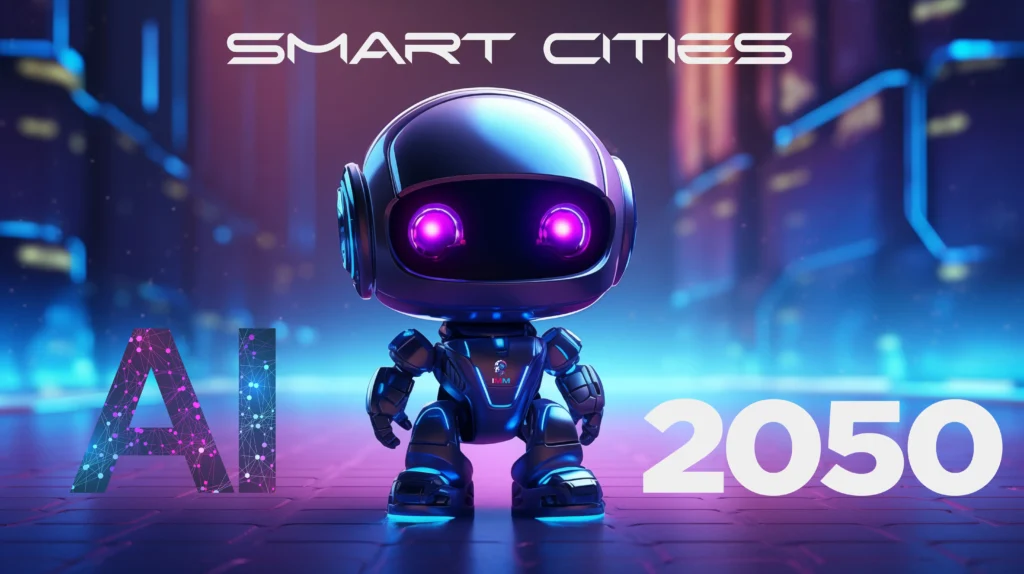The year 2050 will mark a significant milestone in the evolution of urban living, with Artificial Intelligence (AI) at the forefront of this transformation. Intelligent cities, driven by AI, will offer unprecedented efficiency, sustainability, and quality of life. This blog post delves into AI’s pivotal role in developing smart cities by 2050 and its profound impact on urban environments and their inhabitants.

The Backbone of Smart Cities: AI Integration
1. Data-Driven Decision Making
AI will be the core engine of smart cities, leveraging vast amounts of data generated by Internet of Things (IoT) devices, social media, public records, and more. AI will analyze this data through advanced machine learning algorithms to provide actionable insights, enabling city planners and administrators to make informed decisions in real-time. This data-driven approach will optimize urban management, from energy consumption to public safety.
2. Predictive Analytics
Powered by AI, predictive analytics will allow smart cities to anticipate and address issues before they escalate. For example, AI systems will dynamically predict traffic congestion and adjust traffic signals to prevent bottlenecks. Similarly, predictive infrastructure maintenance will reduce downtime and extend the lifespan of critical urban assets, saving costs and improving reliability.
Key AI-Powered Features of Smart Cities
1. Intelligent Transportation Systems
Autonomous vehicles (AVs) will be a cornerstone of smart cities, transforming urban mobility. AI will coordinate AVs, ensuring optimal routes, reducing traffic congestion, and enhancing safety. Public transportation will also benefit from AI, with adaptive schedules and routes that respond to real-time demand. This seamless integration of transportation modes will provide efficient, eco-friendly travel options.
2. Smart Energy Management
AI will revolutionize energy management in smart cities. AI-enhanced smart grids will balance supply and demand, integrate renewable energy sources, and minimize energy wastage. Buildings will be equipped with AI-driven systems that monitor and adjust energy usage based on occupancy and weather conditions, significantly reducing carbon footprints and operational costs.
3. Healthcare and Well-being
AI will play a transformative role in healthcare within smart cities. Wearable health devices and smart home systems will continuously monitor residents’ health, alerting them and healthcare providers to potential issues. AI-driven diagnostics and telemedicine will ensure timely and personalized care, improving health outcomes and reducing the burden on healthcare facilities.
Enhancing Public Safety and Security
1. AI Surveillance and Emergency Response
AI will significantly enhance public safety. Advanced surveillance systems utilizing AI for facial recognition and behavior analysis will help law enforcement swiftly detect and respond to threats. AI will also streamline emergency response, providing real-time data to first responders and coordinating resources efficiently during crises.
2. Cybersecurity
As cities become more connected, cybersecurity will be paramount. AI will be crucial in safeguarding against cyber threats, with intelligent systems continuously monitoring networks, identifying vulnerabilities, and responding to real-time attacks. This proactive approach will protect critical infrastructure and personal data, ensuring the integrity and trustworthiness of innovative city ecosystems.
AI and Citizen Engagement
1. Personalized Services
AI will enable cities to offer personalized services to residents, enhancing their quality of life. From tailored public services to customized healthcare plans, AI will ensure that the needs of each individual are met efficiently. This personalized approach will foster greater satisfaction and engagement among city dwellers.
2. Participatory Governance
AI will facilitate more inclusive and participatory governance. Digital platforms powered by AI will allow residents to engage with city planners, provide feedback, and participate in decision-making processes. This collaborative approach will ensure that urban development aligns with the needs and aspirations of the community, fostering a sense of ownership and belonging.
The Human-Centric Approach to AI in Smart Cities
While AI will drive the technological advancements of smart cities, it is essential to maintain a human-centric approach. The ultimate goal of AI integration is to enhance the well-being and happiness of residents.
1. Inclusivity and Accessibility
Smart cities will prioritize inclusivity and accessibility, ensuring that all residents, regardless of age, ability, or socioeconomic status, can benefit from AI-driven innovations. AI will help design and implement solutions that bridge gaps and provide equal opportunities for all.
2. Ethical Considerations
Ethical considerations will be paramount in the deployment of AI. Transparent algorithms, data privacy, and accountability will be essential to build trust and ensure that AI systems operate pretty and justly. Policymakers and technologists must collaborate to establish frameworks that safeguard against biases and protect individual rights.
Conclusion
The integration of AI in smart cities by 2050 promises a future of unparalleled efficiency, sustainability, and quality of life. By harnessing the power of AI, cities will become more adaptive, responsive, and resilient, creating environments that are not only intelligent but also profoundly attuned to the needs of their residents. As we move towards this future, it is crucial to ensure that AI remains a tool for enhancing human potential and fostering inclusive, thriving communities.